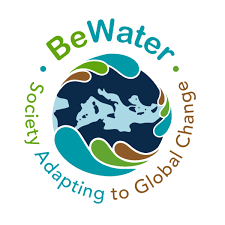
BEWATER – Making society an active participant in water adaptation to global change
Project Overview
The BeWater project promotes dialogue and collaboration between science and society for sustainable water management and adaptation to the impacts of global change in the Mediterranean. BeWater uses an iterative process of mutual learning, participatory techniques and a bottom-up approach to ensure that stakeholders play an active role in determining appropriate strategies for management of river basins.
By actively engaging with local communities, BeWater involves society in discussions on current water uses and their related problems, raising public awareness of the importance of sustainable water management, with particular focus on the expected climate change impacts at River Basin scale. In four Case Study River Basins across the Mediterranean, newly developed methodologies integrating physical, ecological, social and management processes are used to develop Water Management Options. These Management Options are discussed with local communities who participate in drawing up locally-relevant Adaptation Plans, which may be scaled up to develop guidelines of national and international relevance.
Project Results
- Adaptation Plans: A key objective of the BeWater project is the collaborative development of adaptive water management approaches at the river basin scale in the Mediterranean region, and specifically of a River Basin Adaptation Plan for the Pedieos, Rmel, Tordera and Vipava river basins. Using a novel approach developed within and for the BeWater project, four River Basin Adaptation Plans have been developed, following dialogue between science and society, that aim at fostering adaptation to climate change within targeted river basins. The plans contain information on individual water management options, how the water management options could be combined and whether there are potential synergies and conflicts between options.
- Developing Participatory Adaptation Plans for River Basins – a handbook. Throughout the design of the adaptation plans the BeWater project team identified common aspects and needs, as well as barriers and facilitators in the design and future implementation of adaptation plans. These lessons learnt have been synthesised in a handbook for drafting adaptation plans.
- Policy briefs. These recommendations target the decision-makers from the local to European level and draw on the lessons learned and experiences made throughout the duration of the BeWater project across the four case study river basins.
Website
http://www.bewaterproject.eu/Resources
- water-09-00958.pdf
- adaptation plans-rbap pedieos final.pdf
- adaptation plans-rbap tordera final.pdf
- adaptation plans-rbap rmel final.pdf
- adaptation plans-rbap vipava final.pdf
- bewater-handbook-final web.pdf
- review of global river basin adaptation plans.pdf
- policy briefs-policybrief 4.pdf
- policy briefs-policybrief 5.pdf
- policy briefs-policybrief 6.pdf
- policy briefs-policybrief 3.pdf
- policy briefs-bw policy brief no 2.pdf
- policy briefs-bw policy brief no 1.pdf

